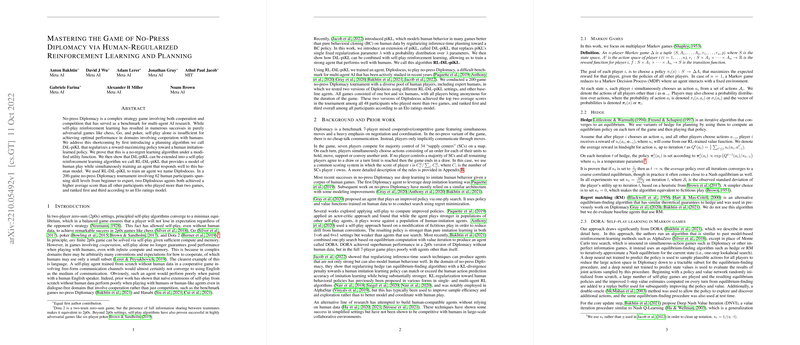Mastering No-Press Diplomacy via Human-Regularized Reinforcement Learning
The paper provides a detailed exploration of an innovative AI agent training approach for the game of no-press Diplomacy, a seven-player strategy game that presents a blend of cooperative and competitive elements without direct communication between players. The authors propose a novel reinforcement learning (RL) framework called RL-DiL-piKL, designed to enhance the agent's performance when interacting with human players by incorporating elements of human behavioral modeling.
Key Contributions
A focal innovation in this work is the Distributional Lambda piKL (DiL-piKL) algorithm, which implements a probabilistic mixture over regularization parameters in reinforcement learning. Unlike previous methods that use a fixed parameter , DiL-piKL samples from a distribution in each iteration, allowing the AI to capture a diverse range of human-like behaviors. This enables the agent to adapt better to human strategies, which often involve implicit conventions beyond mere utility maximization.
Methodology
DiL-piKL is embedded within a self-play RL framework, where the goal is to iteratively refine both the policy and value functions. This involves:
- Policy Regularization: The introduction of the DiL-piKL planning algorithm that uses a reward-maximizing policy adjusted towards human-like behavior.
- Self-Play Reinforcement Learning: The RL-DiL-piKL extension trains agents by simulating interactions with other agents that model human play.
The agent, named Diplodocus, was tested through rigorous simulations against baseline AI agents and real human players. Notably, Diplodocus consistently ranked higher than its peers in a large-scale tournament setting.
Strong Numerical Findings
Diplodocus, leveraging the RL-DiL-piKL algorithm, exhibited superior performance:
- In a 200-game tournament involving human participants, Diplodocus achieved the top two average scores, indicating its strength in adapting to a live human play environment.
- The Elo ratings model used to assess performance demonstrated that Diplodocus securely outperformed other agents when engaged in mixed human-agent matches.
Implications and Future Directions
The research herein suggests that modeling human-like behavior in AI agents enhances their adaptability and effectiveness in cooperative-competitive contexts. Furthermore, this approach broadens the horizons of multi-agent coordination problems where agents must interact with both human players and other AI agents.
Potential future research extensions could involve exploring similar regularization strategies in games incorporating complex communications or negotiations, potentially bridging the gap between pure computational optimality and human-centric cooperation strategies.
In conclusion, the RL-DiL-piKL framework offers a robust pathway toward creating sophisticated AI systems capable of intuitive and strategic interactions in multi-agent environments, marking a significant stride in the quest for human-compatible AI.
